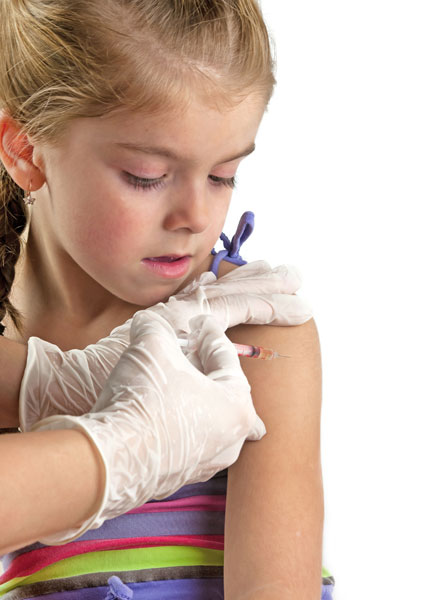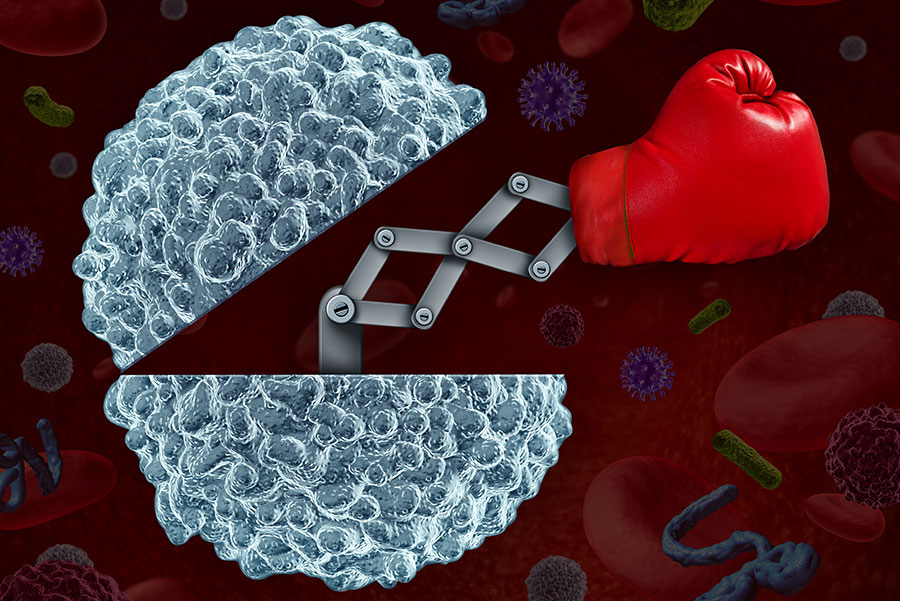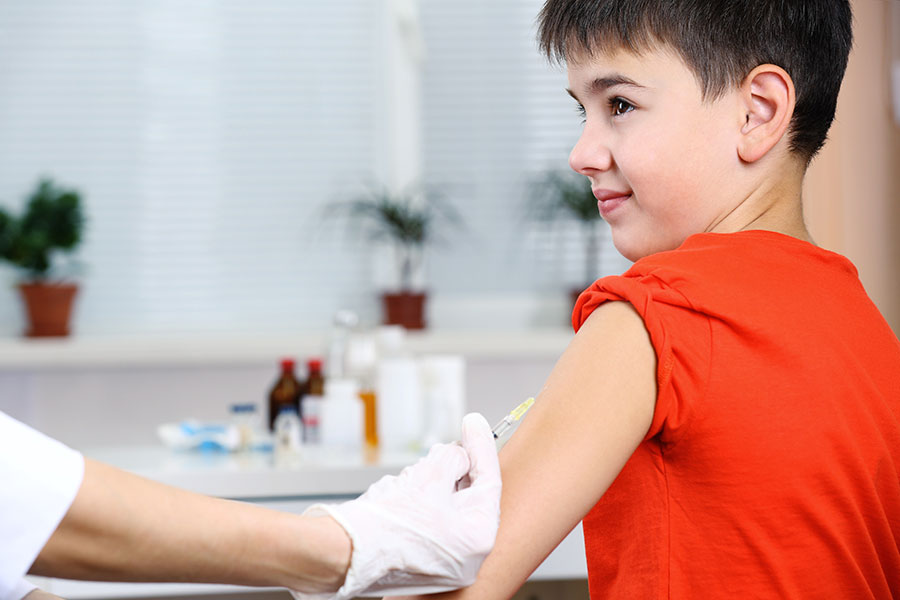As a family doctor, this time of year can be challenging. Flu season is around the corner and the vaccination debate is at the forefront of issues discussed at many of my patient visits. I used to get frustrated at all the time spent reviewing the very compelling reasons to vaccinate oneself and one’s children. I would be angry with the media for propagating untruths and placing fear in the hearts of parents. And I’m not alone. Just check out the expletive-laden segment on Jimmy Kimmel Live where doctors call out the anti-vaccine community on national television. But something changed for me this year. It was an “ah-ha” sort of moment and it has helped me to feel less frustrated and less antagonistic towards patients who refuse immunizations.
What I realized is that no one is making these decisions just to irritate me or make my life difficult. People are simply trying to make the best decisions they can for themselves and for their families. And my job as a doctor is not to bully people into choosing vaccinations but to dispel myths and to educate my patients about the sound science behind vaccines and the important role they play in maintaining our individual health and the health of our community, particularly that of our children. In that way, at least patients are making a fully informed decision. I know I won’t win them all over, but hopefully my patients will come away having learned something and feeling that I have respected their decisions.
The Big Excuses
Over my 14 years of practicing Family Medicine, I have heard many reasons for not vaccinating. I would like to explore them and address each one in turn.
Mercury in vaccines
First, I hear worry over the Mercury content of vaccines – linked in people’s minds to concerns about Autism, birth defects, and more. Vaccines have historically contained Thimerosal, a Mercury containing compound used as a preservative, in order to prevent bacterial and fungal contamination of vaccines. There are two types of Mercury. Methylmercury is toxic to the body and can be found most commonly in certain types of fish.

Federal guidelines work to keep as much of this compound out of our food and out of the environment as possible, though we are all exposed to small amounts over our lifetime. Ethylmercury (which is the form contained in Thimerosal) is cleared from the body much more quickly and so is less likely to be harmful. There are rare US Licensed vaccines (primarily multi-dose vials of Influenza) that use Thimerosal as a preservative but the percent concentration of Thimerosal in these vaccines is typically 0.01% or less. This level confers no toxicity to the patient. The remaining vaccines are now Thimerosal-free! Thimerosal was removed as a precautionary measure, not because of any reproducible evidence of harm. However, certain people still have concerns that Thimerosal is somehow linked to Autism. The research that originally suggested the connection between Thimerosal and Autism has been debunked and the principle investigator on the study stripped of his medical license for falsifying data. In fact, after Thimerosal was removed from vaccinations, the rates of Autism did not decrease but, in fact, continued to climb! There is no link between vaccines and Autism. Let’s move on.
Vaccination could make me sick!
I also hear that the vaccines can make people sick. As in, “I got the flu from the flu shot!” This is not possible. The flu shot is a killed virus vaccine. There is no live virus in it. Therefore, you cannot get the flu from the flu shot.

Getting sick from a regular flu shot is, like, totally unlikely!
What is most likely, if someone gets the flu soon after getting the vaccine, is that the immunity from the vaccine has not yet developed (it takes 2 weeks to become immune to the flu strains in the vaccine after receiving the shot). These folks likely got exposed to the flu during that two-week period and they did not yet have immunization protection.
Sidebar… This doesn’t apply to live attenuated virus vaccines (Influenza nasal spray, Measles, Mumps, and Rubella, Chicken Pox, and Shingles vaccines, among others). We would not want to give these to people who are immune compromised as they could get the illness from the vaccine.
Too much of a good thing
I also hear that getting so many childhood vaccines all at once will overwhelm the immune system. Au contraire, mon frère. Our immune systems, particularly those of infants and children who are crawling around on the floor and putting their hands in their mouths all day long, are exposed to so many more antigens (proteins that trigger the immune system) on a daily basis than they ever would be in any series of vaccinations. And please, get those kids vaccinated on schedule. Not only is there a reason that these vaccines are recommended at certain intervals (the development of fullest immunity is best achieved when taken on schedule), but kids who are dragged to the doctor every month or two to get each individual vaccine separately develop a fear of the doctor’s office and the office staff. This makes it much harder to develop an easy, trusting relationship down the line. Would you want to go see someone regularly who hurt you every time you went in?
I don’t want to make my kid suffer

A prick is a small price to pay

A prick is a small price to pay
“Getting so many shots is going to hurt. I don’t want him/her to have to suffer.” We do things for our children all the time that are not necessarily pleasant to them, yet we still do them because it is in their best interest. “You don’t like broccoli? Okay, you can have ice-cream for dinner”, said no parent ever. The pain of vaccination is temporary but the benefits last for years. Let’s do what is best for our children!
…not getting vaccinated didn’t hurt me!
From you adults out there, I get this one all the time. “Oh I don’t get vaccines. I’m healthy. I never get sick.” I’d like to introduce you to a little something called Herd Immunity. Even though we may not always get sick, or very sick, we can still pass infections to others. While the Whooping Cough that a healthy 35 year old gets may only cause a prolonged annoyance or time off of work for that person, it can kill the baby they are sitting next to on the plane. We do not live in isolation. We are part of a wider world. We vaccinate all, not just the sick or higher risk, because all of us have a role in keeping the community safe and healthy. When I vaccinate my children, and myself, I am keeping you and your children safe. Won’t you please return the favor?
It’s a conspiracy…
The paranoia defense: “Aw, you doctors just want me to get _______ (insert preventive care measure, i.e. – flu shot, colonoscopy, etc.) so you can make money.” Or, “That’s just the _______ (insert large organization, i.e. – government, insurance companies, drug companies, etc.) trying to control us.”
Dear patient, there is no conspiracy here… unless the conspiracy is to keep you healthy and to save lives. For some reason, doctors have gotten a bad rap in some circles. Despite the assertion of some that we are just elitist and money-grubbing, most of us actually went into medicine because we truly care and because we want to help people live happier, healthier lives.
Guillian-Barre Syndrome
“I heard someone died/was paralyzed/stopped breathing after getting a vaccine”. One of the most feared reactions to a vaccination is called Guillain-Barre Syndrome (GBS), a neurologic condition that can cause paralysis. When this happens it is certainly terrible, but the Centers for Disease Control estimates that, if there were a risk of GBS from influenza vaccination, for example, it would be only 1-2 cases out of 1 million people vaccinated, an incidence much lower than that of severe complications from an influenza infection itself. Studies also suggest that the incidence of developing GBS after an influenza infection is even greater than that of developing GBS after influenza immunization. I’m not saying bad things can’t happen. People do rarely have severe reactions from getting a vaccine. But your child could eat a cashew or a tomato or a strawberry tomorrow and develop trouble breathing. That doesn’t mean you would stop feeding him or her. It is much more likely that you would develop complications from an illness than from the vaccine meant to protect you from that illness!
The Big Picture
Maybe we have become complacent. After all, in most of our lifetimes, we have not had to deal with epidemic illness. We have developed this “It will never happen to us” attitude. The last major epidemic (there have certainly been more recent epidemics but less widespread) was the Influenza Epidemic of 1918. It killed 50 million people, more than were killed during the whole of World War I. It affected 1/5th of the world’s population. These are staggering figures! But we haven’t had one of these in a while (thank God and thank vaccines). Other diseases have similarly gone by the wayside. In the developed world, we no longer see children paralyzed by Polio. We rarely see fetal demise related to Rubella during pregnancy. These are all vaccine-preventable illnesses.
Do you know why we no longer see these complications? Because our parents and grandparents vaccinated us, that’s why! How disappointed they would be in us for taking life and health so lightly. I bet every single person who lost a child or spouse or sibling to influenza in 1918 would have gotten or given the vaccine in a heartbeat if it were available.

Vaccination delivered a knockout punch for numerous diseases in the 20th Century. Keeping your children vaccinated will help to make sure the measles, mumps and worse maladies stay down for the count.
The thing is, these diseases are still out there and some are beginning to see resurgence. People still die every year from complications of the flu. Children and adults still get pneumonia and encephalitis (an inflammation of the brain) from Chicken Pox. Babies still die from Whooping Cough. Teenagers and young adults still die, develop seizures, and lose limbs from Meningococcal Meningitis. Measles is on the rise again, thanks in part to the anti-vaccine movement.
If the human cost doesn’t strike a chord, consider the financial cost of these illnesses. Let’s take Chicken Pox, for example. The average Chicken Pox vaccine costs about $150.00 out of pocket per dose, less with insurance. During the Chicken Pox illness, a person is contagious from 24 hours prior to when the rash breaks out until all lesions are crusted or scabbed over. This can take up to 10-14 days. Imagine the cost to a family in medications, doctor’s bills, lost wages from missed work, missed days of school and, heaven forbid, any hospital bills if there are complications. And what if there is more than one child in the family who develops the illness? The impact is potentially huge!
Those cynical ones of us out there might say “Oh well, it’s just natural selection in action, survival of the fittest.” The problem with this argument is that it’s not the children, the ones who are most affected by not getting vaccinated, who are making these decisions. Parents opt not to get their kids vaccinated and kids pay the price.
So, please. Let’s stop all this arguing. Vaccines work. Vaccines are safe. Vaccines save lives. Let’s do what is right for our children, our community, and ourselves. Vaccinate!

If you are interested in doing more reading about vaccination safety, search “vaccine safety” at the following websites:
• Centers for Disease Control website at www.cdc.gov
• The World Health Organization website at www.who.int
• The Journal of the American Medical Association at www.jama.com. I recommend the article Historical Comparisons of Morbidity and Mortality for Vaccine-Preventable Diseases in the United States by Roush, MT, MPH and Murphy, MD.



 Gretchen LaSalle
Gretchen LaSalle 